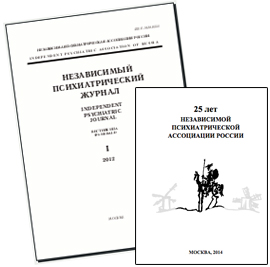Abstracts of №4, 2012
Contemporary diagnosis and therapy of unipolar depressions: myths and reality
N.A. Maruta (Kharkov, Ukraine)
This article is a clinical lection which contains answers the most problematic questions rising in performing antidepressant therapy.
These questions regard an etiology of unipolar depressive disorder, diagnosis, therapeutic targets, antidepressant choice and efficacy, adverse events of these antidepressants. In the article algorithms of therapeutic response assessment and strategies of a resistance overcoming also presented, as well as a performing of stabilizing and preventive therapy, peculiarities of usage of psychotherapy for patients with unipolar depression, and many other aspects.
The article is based on results of randomized clinical trials characterized with high evidence levels.
Key words: diagnosis, therapy, unipolar depression, efficacy, psychotherapy, resistance
Transcultural features of the depressed disorder
O.S.Chaban (Kiev, Ukraine), N.Hauser (Zurich, Switzerland)
Results of clinical researches of the patients suffering from depressive disorder, in Switzerland and in Ukraine are considered. Researches were conducted on the basis of the analysis of subjective experiences of pathological phenomena, the test of a family condition. Distinctions in a self-assessment of patients and comparison of the condition by them with concept of a depression are revealed. The Swiss patients were more focused on biological indicators of a depression, Ukrainian – on social.
Keywords: psycho-social risk factors, depression, welfare factors, family relations, “broken home”.
Subjective excessive emotional reactions: phenomenology, mechanisms, therapy
A.M.Burno
Special kind of emotional response — Subjective Excessive Emotional Reactions — is investigated. Main cognitive element of this feeling – «empty effort», tendency to manage an own psychological process by will-power only – is discovered. Possibility and outcomes of cognitive reorganization are discussed.
Keywords: subjective excessive emotional reactions, “empty effort”, natural negative emotional reactions, force of will, cognitive therapy, rational-emotional behavioral therapy
Representative of the patient
Yu.N.Argunova
The institute of representation of interests of the capable patient when rendering the psychiatric help is considered: types of representation, order of registration, power of the representative, obligation of administration of еру institution. Provisions of the legislation on a free legal aid for patients of this category are analyzed. Inadmissibility of ignoring of right of the patient to invite representative at his own choice for protection of the rights and legitimate interests locates is justified.
Keywords: the representative of the patient, the right of the patient when rendering the psychiatric help
To a question of legality of law-enforcement practice regarding an order of establishment of dispensary supervision concerning the persons having mental disorders
A.G.Ustinov
In the article the juridical-technical defect of Art. 20 of the Federal law of November 21, 2011 No. 323-FZ «On bases of health protection of citizens in the Russian Federation» regarding uncertainty in aspect of legal regulation of an order of establishment of dispensary supervision as type of medical intervention allowed by the legislator is indicated.
Keywords: the dispensary supervision, the informed voluntary consent, medical intervention; the persons with heavy mental disorders
14-year experience in psychiatric care to somatic patients with psychotic and initial dementia disorders in a multidisciplinary hospital
V.N.Prokudin
In the article the results of 14 years’ work of Department of Psychotherapy in Moscow Clinical Hostital # 36 and consultation and treatment of 9567 somatic patients with co-morbid psychotic and initial dementia disorders are analyzed. Use of a team method of work (internist+psychologist+psychotherapist or the psychiatrist), various methods of psychological correction, psychotherapy and psychopharmacotherapy allowed to stop effectively being available co-morbod mental disorders and to improve quality of life of these patients. The special attention was paid on organizational questions: choice of organizational model of rendering the psychiatric help (“attachment-liaison”), continuous increase of knowledge of internist in clinical psychiatry.
Keywords: co-morbidity, organizational model “attachment-liaison”, training of internist in foundations of psychiatry, integration of psychiatry into somatic medicine.



